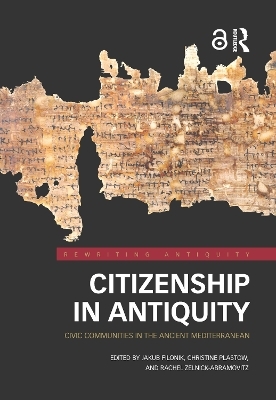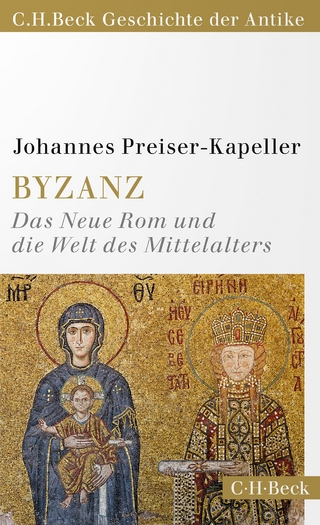
Citizenship in Antiquity
Routledge (Verlag)
978-0-367-68711-3 (ISBN)
Citizenship in Antiquity brings together scholars working on the multifaceted and changing dimensions of citizenship in the ancient Mediterranean, from the second millennium BCE to the first millennium CE, adopting a multidisciplinary and comparative perspective.
The chapters in this volume cover numerous periods and regions – from the Ancient Near East, through the Greek and Hellenistic worlds and pre-Roman North Africa, to the Roman Empire and its continuations, and with excursuses to modernity. The contributors to this book adopt various contemporary theories, demonstrating the manifold meanings and ways of defining the concept and practices of citizenship and belonging in ancient societies and, in turn, of non-citizenship and non-belonging. Whether citizenship was defined by territorial belonging or blood descent, by privileged or exclusive access to resources or participation in communal decision-making, or by a sense of group belonging, such identifications were also open to discursive redefinitions and manipulation. Citizenship and belonging, as well as non-citizenship and non-belonging, had many shades and degrees; citizenship could be bought or faked, or even removed. By casting light on different areas of the Mediterranean over the course of antiquity, the volume seeks to explore this multi-layered notion of citizenship and contribute to an ongoing and relevant discourse.
Citizenship in Antiquity offers a wide-ranging, comprehensive collection suitable for students and scholars of citizenship, politics, and society in the ancient Mediterranean world, as well as those working on citizenship throughout history interested in taking a comparative approach.
Chapters: Chapters 47 and 48 of this book arefreely available as a downloadable Open Access PDF at http://www.taylorfrancis.com under a Creative Commons Attribution-Non Commercial-No Derivatives (CC-BY-NC-ND) 4.0 license.
Jakub Filonik is an Assistant Professor at the University of Silesia in Katowice, Poland. He has published on Athenian oratory, Greek law, political metaphors, and liberty ancient and modern; co-edited special issues on ancient identities (Polis; The European Legacy) and a volume The Making of Identities in Athenian Oratory (Routledge). Jakub translated selected Athenian speeches into Polish (with commentary). He is currently working on monographs focussed around the rhetoric of freedom in classical Athens and Greek political metaphors. Christine Plastow is a Lecturer in Classical Studies at The Open University, UK. Her research interests fall into two main areas: practice-as-research work on modern adaptations of Greek tragedy and myth (with By Jove Theatre Company), and the study of the rhetoric, law, and social history of Athenian forensic oratory. Her book Homicide in the Attic Orators was published by Routledge in 2020. Rachel Zelnick-Abramovitz is a retired Professor at the Department of Classics, Tel Aviv University, Israel. Her research covers slavery and other non-citizen groups in the Greek polis; the shifting lines between the private and public spheres in the Greek polis; Greek historiography; Greek drama; and rhetoric. She is the author of Not Wholly Free: The Concept of Manumission and the Status of Manumitted Slaves in the Ancient Greek World (2005), Taxing Freedom in Thessalian Manumission Inscriptions (2013), and articles on these subjects, published in journals and edited collections. She co-edited Text and Intertext in Greek Epic and Drama (2021) and translated Herodotus into Hebrew. Her current research project, funded by the Israel Academy of Sciences, is the verbs of speaking (verba dicendi) used by Greek historians to describe their own and their characters’ historiographical activity.
1 Jakub Filonik, Christine Plastow, and Rachel Zelnick-Abramovitz, ‘Citizenship in antiquity: current perspectives and challenges’; Part One: Theory of citizenship; 2 Catherine Neveu, ‘Exploring citizenship(s) in context(s): anthropological perspectives'; 3 P.J. Rhodes, ‘Greek citizenship’; 4 Alain Duplouy, ‘Lifestyle and behaviour in archaic and classical Greece: the other language of citizenship’; 5 Markus Sehlmeyer, ‘Models of Roman citizenship from Augustus to Boris Johnson’; Part Two: The Ancient Near East; 6 Eva von Dassow, ‘Citizens and non-citizens in the age of Hammurabi’; 7 N. İlgi Gerçek, ‘Citizenship in Hittite Anatolia’; 8 Mark Woolmer, ‘The evolution of citizen councils and assemblies in ancient Phoenicia’; 9 Shai Gordin, ‘Neo-Babylonian citizenship practices in a comparative Mediterranean context’; Part Three: The Greek world; 3.1 Archaic and classical Greece; 10 Irad Malkin, ‘The supreme arbitrator and the dēmos: city-founders and reformers’; 11 Gunnar Seelentag, ‘"Citizens" and "others" in archaic and early classical Crete’; 12 Ryszard Kulesza, ‘Spartan oliganthrōpia and homoioi’; 13 Katarzyna Kostecka, ‘Exile and conflicting identities in archaic and early classical Greece’; 14 Barbara Schipani and Ferdinando Ferraioli, ‘Granting citizenship to women in ancient Epirus’; 15 Ryszard Kulesza, ‘Citizenship and the Spartan kosmos’; 16 Roger Brock, ‘Civic subdivisions and the citizen community’; 17 Stefano Frullini, ‘The language of citizenship in Herodotus and Thucydides’; 18 Bartłomiej Bednarek, ‘Performing the city: religious aspects of Greek citizenship’; 19 Jakub Filonik, ‘Sharing in the polis: conceptualizing classical Greek citizenship’; 3.2 Classical Athens; 20 Chris Carey, ‘The citizen body’; 21 Fayah Haussker, ‘Smuggling infants: citizenship fraud in classical Athens’; 22 Brenda Griffith-Williams, ‘Polis and oikos: citizenship and family membership in classical Athens’; 23 Linda Rocchi, ‘Identity, status, and "dishonour": was atimia relevant only to citizens?’; 24 Christopher Joyce, ‘Could Athenian women be counted as citizens in democratic Athens?’; 25 Christine Plastow, ‘Places of citizenship in Athenian forensic oratory’; 26 Nick Fisher, ‘Citizenship anxieties: the Athenian diapsēphisis of 346/5 BCE’; 27 James Kierstead and Sofia Letteri, ‘Appeals to associations and claims to citizenship in Athenian oratory’; 28 Brad L. Cook, ‘"He’s a Scythian!": the "birther" attack in classical Athens’; 29 Janek Kucharski, ‘Darkest hour: Hyperides and the emergency measures after Chaeronea’; Part Four: The Hellenistic world; 30 Susanne Carlsson, ‘Citizenship in the Hellenistic period’; 31 Randall Souza, ‘Citizenship in the classical and Hellenistic western Mediterranean’; 32 Christian A. Thomsen, ‘Citizenship, identification, and the metic experience in classical and early Hellenistic Greece’; 33 Patrick Sänger, ‘Hellenistic Egypt and the hybridization of "citizenship"’; 34 Christel Müller, ‘The making of the citizen in Hellenistic poleis’; Part Five: Between and beyond Greece and Rome; 35 Dexter Hoyos, ‘Citizens and citizenship in pre-Roman Carthage’; 36 Edward M. Harris and Sara Zanovello, ‘Manumission and citizenship in ancient Greece and Rome’; 37 Katell Berthelot, ‘Jewishness as "citizenship" in Jewish writings from the Hellenistic and Roman periods’; 38 Lucia Cecchet, ‘Multiple citizenship in Roman Asia Minor’; 39 Andrea Raggi, ‘The Greeks and the right of Roman citizenship in the late Republic’; Part Six: Rome and the Roman world; 40 Guy Bradley, ‘Politics and citizenship in Etruscan and Italic societies’; 41 Roman Roth, ‘Rome’s Italian expansion and the transformation of Roman citizenship (387 – 91 BCE)’; 42 Craige B. Champion, ‘Religion and citizenship in Republican Rome’; 43 Clifford Ando, ‘Census, censor, citizenship: republican subjectivity in advance of monarchy’; 44 Martyna Świerk, ‘Citizenship in the Roman provinces: the example of Africa’; 45 Maria Nowak, ‘Citizenship in Roman Egypt before 212 CE’; 46 Arnaud Besson, ‘Towards universal citizenship: the Roman Empire in 212 CE’; Part Seven: Late antiquity and the Middle Ages; 47 Javier Martínez Jiménez and Robert Flierman, ‘The uses of citizenship in the post-Roman West’; 48 Els Rose, ‘Christian reconceptualizations of citizenship and freedom in the Latin West’; 49 Dion C. Smythe, ‘Citizenship and belonging: a view from Byzantium’.
| Erscheinungsdatum | 11.07.2023 |
|---|---|
| Reihe/Serie | Rewriting Antiquity |
| Zusatzinfo | 1 Tables, black and white; 6 Halftones, black and white; 6 Illustrations, black and white |
| Verlagsort | London |
| Sprache | englisch |
| Maße | 174 x 246 mm |
| Gewicht | 1374 g |
| Themenwelt | Geschichte ► Allgemeine Geschichte ► Altertum / Antike |
| Geisteswissenschaften ► Philosophie | |
| Sozialwissenschaften ► Politik / Verwaltung ► Politische Theorie | |
| ISBN-10 | 0-367-68711-9 / 0367687119 |
| ISBN-13 | 978-0-367-68711-3 / 9780367687113 |
| Zustand | Neuware |
| Haben Sie eine Frage zum Produkt? |
aus dem Bereich


